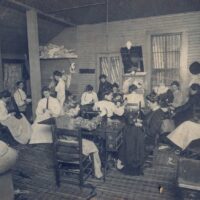I was walking up the sidewalk Tuesday morning, headed to the building on South Main Street where I have an office, when a woman waiting for the light to change at Seventh Street called for me through her open car window.
“Can you come over here and push that button?,” she asked.
She was pointing to the pedestrian signal on a pole next to the sidewalk.
“This light has been red for five minutes,” she told me.
“Sure,” I said.
I swear the light seemed to hear the driver’s complaint; it changed just as I pushed the button for her.
You might think I’m sharing this little encounter as a lesson in the virtue of patience. No, that’s not where I’m headed. I am shamefully impatient, so I understood the woman’s aggravation.
What I thought as I turned from the intersection to walk to my office was how much I appreciate interactions with strangers. Hopkinsville seems like the ideal-sized town for this. It is small enough that I can expect to encounter numerous people every day that I’ve known for many years (if not most of my life). But the town is also large enough to throw in a number of unpredictable encounters with strangers who are comfortable sharing a wave or asking for a little favor — such as, please walk over here and push that button for me.
In the past five years I’ve read or listened to several news articles about the benefits of talking with strangers. I assume the pandemic made many of us take stock of temporarily losing these serendipitous moments.
An NPR story that ran in 2024 described how a university student majoring in psychology was inspired to do research into the effects of social interactions. In one study 50 participants were given a pair of clickers — one to click when they interacted with someone they knew well and the other to click when they encountered a stranger or someone who was not a close tie.
“In general, people who tended to have more conversations with weak ties tended to be a little happier than people who had fewer of those kinds of interactions on a day-to-day basis,” the researcher told NPR.
In addition, the study revealed that “each participant was happier on the days they had more of these interactions,” according to the story.
I know my mood was lifted a bit when I responded to the downtown driver seemingly stuck at a red light. Even though the light was about to change to green at the exact moment I took a few steps to help out, I kinda felt like I’d started the day with a good deed. The woman didn’t really need my help, but she did need to be seen and heard. I could do that much.
What’s that saying? It’s the little things that count. It believe that is true.
Jennifer P. Brown is co-founder, publisher and editor of Hoptown Chronicle. You can reach her at editor@hoptownchronicle.org. Brown was a reporter and editor at the Kentucky New Era, where she worked for 30 years. She is a co-chair of the national advisory board to the Institute for Rural Journalism and Community Issues, governing board past president for the Kentucky Historical Society, and co-founder of the Kentucky Open Government Coalition. She serves on the Hopkinsville History Foundation's board.





